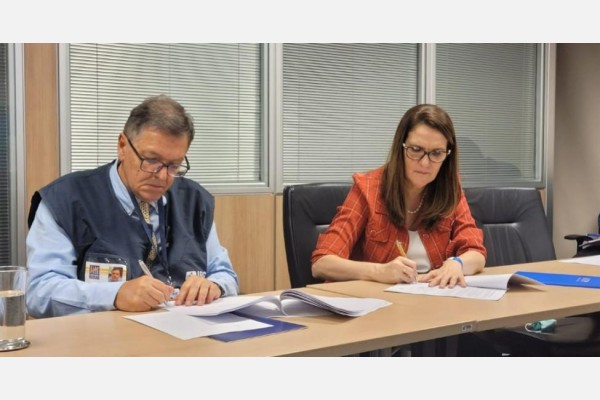Repository of Practices

Collection of information on international migrants in the Brazilian Demographic Census
Secondary GCM Objectives
Dates
Type of practice
Geographic scope
Country:
Regions:
Sub Regions:
Local:
Summary
The initiative has been carried out within the framework of the Technical Cooperation Agreement between IOM Brazil and the Brazilian Institute of Geography and Statistics (IBGE) for the realization of joint actions and the offer of technical support from IOM to IBGE during the 2022 Demographic Census. This was signed in August 2022. The collaboration focuses on: the collection of census data of the migrant population in the State of Roraima, particularly in the municipalities of Boa Vista and Pacaraima, and in other Brazilian states; conducting discussions related to the analysis of census results, and the planning and analysis of IBGE's sample surveys.
For the 2022 Census, IOM provided support in:
- Translation of the questionnaire and information materials into Spanish, English, French, Mandarin and Arabic.
-Mobilization and dissemination of the census among the migrant population, especially Venezuelans in federal shelters and spontaneous settlements in the state of Roraima, through the promotion of information sessions and dissemination of information materials.
-Accompanying surveyors in conversations with community leaders and in the administration of questionnaires in areas where IOM operates. -Providing translators in specific contexts where it was not possible to use translated questionnaires or have support from community members.
-Training institute census takers on migration, indigenous migrant populations, and spontaneous settlements.
-Disseminating the monthly report "Venezuelan Refugee and Migrant Population Outside of Shelters in Pacaraima and Boa Vista," containing georeferenced statistics and information, produced by IOM using the Displacement Tracking Matrix (DTM) methodology.
In addition, IBGE invited IOM to participate in discussions related to the stages of analyzing Census results, reviewing publications related to migration topics, and constructing questionnaires for the institute's intracensal sample surveys (those are sample surveys of diverse topics, such as economy, health, environment, among others). To support data collection for the 2022 Census, IOM conducted information sessions in Informal settlements in Boa Vista and Pacaraima with the goal of clarifying the purpose and importance of participation in the process, as well as distributing informational materials and recording and disseminating audio messages in community WhatsApp groups. Moreover, IOM accompanied census takers and supervisors, IBGE employees, who were conducting data collection in Venezuelan indigenous communities and in the Reception and Support Centers (PRA) – temporary accommodations for immigrants managed by IOM in coordination with the Brazilian government – in Boa Vista and Pacaraima.
Organizations
Main Implementing Organization(s)
Detailed Information
Benefit and Impact
In addition, it is estimated that dissemination activities (audios, printed and virtual materials), as well as the translation of questionnaires and other joint actions, have contributed to the census workers being able to properly interview and register migrants currently residing in Brazil.
Key Lessons
-Regarding the translation of questionnaires and promotional materials, there was a perceived need for a more effective communication channel with IBGE to expedite the delivery of products due to the short execution timeframe. Additionally, the importance of conducting a test of the translated questionnaire with the target population was recognized to ensure that the translation serves its purpose. Given the presence of highly specific terms related to the Portuguese language or Brazilian culture in the questionnaires, prior terminological alignment between OIM and IBGE was necessary.
-Regarding the implementation of actions, there was an understanding of the need to ensure the development of a joint work plan and a schedule of field visit activities with clearly defined responsibilities and deadlines. This also included ensuring the creation of an activity plan related to the communication areas of both institutions to address media demands.
The agreement has allowed the establishment of a communication channel between IOM and IBGE, enabling the possibility of forming new partnerships for future surveys. Given the positive experience, good practices, and technical support will be extended to other surveys conducted by IBGE, in addition to the 2022 Demographic Census, such as the PNDS (National Demography and Health Survey), scheduled for the second half of 2023.
Recommendations(if the practice is to be replicated)
2. Develop a communication plan with communities to reduce the risk of misinformation and non-participation of the migrant community in the census
Innovation
Additional Resources
Date submitted:
Disclaimer: The content of this practice reflects the views of the implementers and does not necessarily reflect the views of the United Nations, the United Nations Network on Migration, and its members.
More Related Practices:
- Strengthening the capacities and frameworks to collect data and evidence on migration, the environment and climate change (MECC) in Mexico
- Disaggregated Data Action Plan (DDAP) - Statistics Canada
- Immigration, Refugees, and Citizenship Canada’s Use of Gender Based Analysis Plus (GBA Plus)
- Tablero Interactivo Estadísticas sobre Movilidad y Migración Internacional en México
- International Labour Migration Statistics (ILMS) Database in the Association of Southeast Asian Nations (ASEAN) region
Peer Reviewer Feedback:
*References to Kosovo shall be understood to be in the context of United Nations Security Council resolution 1244 (1999).
Newsletter
Subscribe to our newsletter.